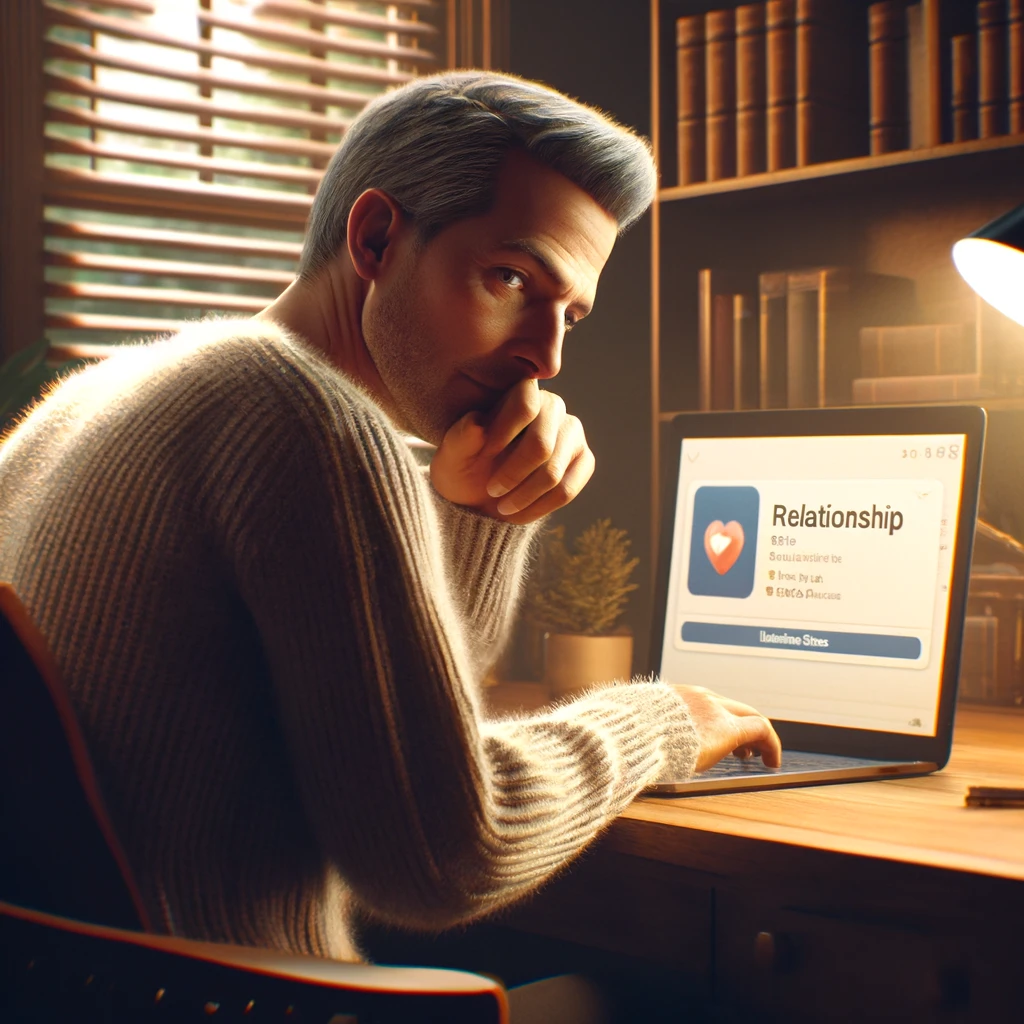
DALL-E
In today’s interconnected world, the lines between friendly interaction and inappropriate behavior can sometimes blur. One term gaining traction in the relationship lexicon is “micro-cheating,” referring to seemingly small actions that suggest a person is emotionally or physically focused on someone outside their relationship, even if there’s no outright infidelity. These can range from secretive behaviors to boundary-crossing friendships. Identifying micro-cheating is key to maintaining trust and transparency in a relationship. Here are 15 subtle signs that might suggest you’re micro-cheating on your partner.
1. You’re saving someone under a fake name

DALL-E
Saving someone’s contact information under a false name in your phone might seem harmless, but it implies a need to disguise the nature of your relationship. If you feel the need to lie about who you’re communicating with, it’s worth asking yourself why. This behavior can indicate that you’re trying to keep your interactions a secret, avoiding accountability. It’s a way to dodge any potential questions or concerns your partner might have about the person. This tactic not only erodes trust but also suggests you value privacy over transparency when it comes to certain people.
2. You frequently check an ex’s social media

DALL-E
Checking an ex’s social media might start as curiosity, but frequent checks can signal lingering attachment. If you’re keeping tabs on an ex’s life, consider the emotional investment this behavior signifies. Such actions can create feelings of intimacy or connection that are inappropriate given your current relationship. It also diverts emotional energy away from your partner, potentially harming your relationship’s emotional intimacy. This habit can stir up old feelings that compromise the commitment to your current partner.
3. You share jokes or memes privately with someone else

DALL-E
Sharing jokes, memes, or humorous articles with someone other than your partner might seem innocuous, but it can create a private world between you and that person. These exchanges often foster a sense of intimacy and exclusivity, akin to inside jokes. If you’re hesitant to show these interactions to your partner, it might be a sign that you’re crossing a boundary. This subtle form of micro-cheating carves out a special space in your life reserved for someone else. It’s particularly concerning if your partner feels left out or less favored in the humor department.
4. You dress specifically to impress someone

DALL-E
Dressing up is typically associated with self-expression or professional necessity, but if you find yourself choosing outfits based on what one specific person might think, you’re venturing into risky territory. Whether it’s a coworker or a friend, dressing to catch someone’s eye goes beyond basic self-care or style. It indicates a desire to attract attention and admiration from someone other than your partner. This kind of behavior not only reflects your priorities but also sends a message about whose opinion matters most to you.
5. You lie about your relationship status

DALL-E
Downplaying or hiding your relationship status when interacting with others is a significant red flag. Whether you omit mentioning your partner in conversations where it’s relevant or outright deny being in a relationship, these lies suggest you’re keeping your options open or protecting a connection with someone else. This undermines the foundation of trust and respect in your relationship. By not acknowledging your partner, you’re not only disrespecting them but also indicating a willingness to explore connections outside your commitment.
6. You have a “back-up” person

DALL-E
Thinking about someone as a potential option if your current relationship doesn’t work out is a textbook case of micro-cheating. Keeping someone in the wings—not just as a friend but as a romantic interest—shows a lack of commitment to your relationship. This mental reservation about your current partnership diminishes the exclusivity and seriousness of your commitment. It’s harmful to your relationship’s stability and your partner’s sense of security.
7. You keep private conversations

DALL-E
If you’re having conversations that you wouldn’t want your partner to see or know about, ask yourself why. Whether it’s flirty texts, emotional confessions, or long chats into the night, these communications can form a bond that supersedes the one with your partner. Keeping these dialogues under wraps can erode trust and create a parallel relationship that exists without your partner’s knowledge or consent. This dual existence is harmful to the transparency and honesty required in a committed relationship.
8. You fantasize about another person frequently

DALL-E
Fantasizing about someone else, especially when it becomes frequent or intense, can be more than just a fleeting thought; it can indicate a deeper dissatisfaction with your current relationship. While it’s normal to find others attractive, consistent fantasies about another person can lead to emotional distance from your partner. This kind of daydreaming can fill a void that your relationship should be filling, potentially leading to more significant emotional or physical infidelities.
9. You make excuses to meet up with someone

DALL-E
Creating reasons to see someone you’re attracted to outside of necessary interactions is a sign of micro-cheating. Whether it’s going out of your way to be at places where they’ll be or inventing reasons for meetings, these actions suggest a desire to deepen a connection that shouldn’t be there. This behavior prioritizes another person’s company over your partner’s, which can feel like a betrayal even if nothing physical has occurred.
10. You feel guilty about your interactions with someone

DALL-E
Guilt is a telling emotion—its presence often indicates that you know something isn’t right. If you feel guilty after interacting with someone, it’s a strong sign that you’re crossing boundaries you shouldn’t be. This internal conflict can arise from behaviors you know would hurt your partner if discovered. Listening to this guilt and reassessing your actions is crucial for maintaining the integrity of your relationship.
11. You hide your phone or computer screen

DALL-E
The act of hiding your phone or computer screen from your partner suggests you have something to hide. Whether it’s messages, emails, or social media interactions, secrecy about your digital life points to a lack of openness and possibly inappropriate behavior. If you’re not comfortable sharing your screen freely, consider what you’re trying to keep private and why.
12. You prioritize someone else’s advice over your partner’s

DALL-E
When you start valuing someone else’s opinions or advice more highly than your partner’s, it can create a rift between you. This reliance on another person’s judgment over your partner’s can weaken the trust and partnership you’ve built. It also shows a shift in emotional alliance and can be particularly hurtful if your partner notices this change.
13. You have nostalgic feelings for a past relationship

DALL-E
Nostalgia for a past relationship can sometimes be harmless reminiscing, but when it becomes a frequent escape, it’s a sign of micro-cheating. Longing for the past often reflects dissatisfaction with the present and can prevent you from fully committing to your current relationship. If you find yourself comparing your partner unfavorably to someone from your past, it’s time to take a closer look at your feelings and motivations.
14. You engage in long, secretive phone calls

DALL-E
Engaging in long phone calls that you keep secret from your partner can be a significant breach of trust. These calls, especially if they’re frequent or occur at odd hours, suggest a level of intimacy that typically belongs in a romantic relationship. If you’re investing time and emotional energy in someone else through these calls, it’s a disservice to your partner and the relationship you’re supposed to be nurturing.
15. You feel emotionally distant from your partner

DALL-E
Finally, if you feel emotionally distant from your partner and closer to someone else, it’s a sign that your emotional energies are being redirected. This distance can manifest as less communication, reduced intimacy, or a general feeling of disconnection in your relationship. When your emotional needs are being met elsewhere, it’s crucial to address why and how to realign your priorities to foster closeness with your partner.
Time for Reflection

DALL-E
Recognizing these subtle signs of micro-cheating is the first step towards maintaining the health and integrity of your relationship. It requires honest self-reflection and a commitment to fostering an environment of transparency and trust with your partner. If any of these signs resonate with you, it might be time to reevaluate your interactions and ensure that your relationship remains your top priority. Remember, the strongest relationships are built on trust, respect, and open communication.
